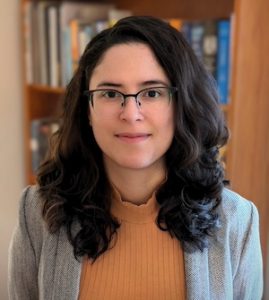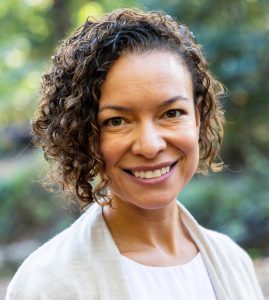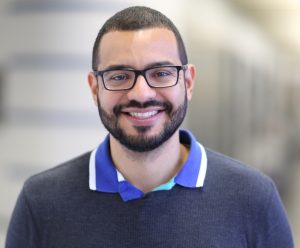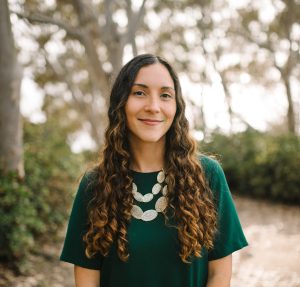
The Trustees are delighted to announce that the 2024 Henry Grass Rising Stars in Neuroscience Award winner is Dr. Maria Victoria Moya!
Dr. Moya is a postdoctoral research fellow in the Biomedical Engineering department at Boston University. She is interested in how unique neuronal cell types in the brain wire together to form functional neural circuits. In her postdoctoral work, she is applying cutting edge techniques for imaging neuronal activity and for molecular identification of cell types to develop new experimental approaches that can map brain circuits at high-scale. In the future, she plans to apply her skillset to understand how precise neural connectivity is established during development, and how it can change in response to disease. In addition to the Henry Grass Rising Stars in Neuroscience award, she has received a Ruth L. Kirschstein Postdoctoral National Research Service Award (F32-NIMH), as well as a Distinguished Fellowship from the Center for Systems Neuroscience at Boston University.
The award recognizes excellence in scientific research and inspiring promotion of diversity by postdoctoral neuroscientists! Congratulations to Dr. Moya, and thank you to everyone who took the time to apply for the 2024 Henry Grass Rising Stars in Neuroscience Award! Applications for a 2025 Rising Stars award will be accepted at a date to be determined. Please check the Guidelines below, or the Foundation’s twitter account, for updates.

The 2023 Henry Grass Rising Stars in Neuroscience Award was Dr. Hector Arciniega. A Postdoctoral Research Fellow in Psychiatry at Harvard Medical School and Brigham and Women’s Hospital at the time of his award, Dr. Arciniega is now Assistant Professor in the Department of Rehabilitation Medicine at New York University’s Grossman School of Medicine.
Dr. Arciniega’s graduate research focused on investigating the time course of recovery and degree of rehabilitation from concussion using behavioral, neuropsychological, electroencephalogram (EEG), and resting state fMRI approaches. In his postdoctoral position at the Psychiatry Neuroimaging Laboratory, Dr. Arciniega is studying the cognitive and neural consequences that follow repetitive head impacts in former American football players using data from the DIAGNOSE-CTE Research Project using neuropsychological, neruopsychiatric, strucutural MRI, diffusion MRI, and resting state fMRI data.
In 2022, the Trustees awarded two Henry Grass Rising Stars Awards!

Dr. Valerie Darcey, PhD, MS, RD is a postdoctoral researcher at the National Institute of Diabetes and Digestive and Kidney Diseases, part of the United States National Institutes of Health. Dr. Darcey is a neuroscientist and Registered Dietitian interested in how what we eat influences the brain activity and neurochemistry behind impulse control. Though her human neuroimaging studies using techniques like fMRI, MRS, and PET, Dr. Darcey demonstrates the link between omega-3 fatty acids, impulse control and prefrontal function in typically developing adolescents as well as the effect of reduced fat diets on increasing dopamine tone and palatable food choice in adults with obesity.
Dr. Darcey was a participant at the 64th Lindau Nobel Laureate Meeting on Physiology or Medicine, a 2021 Intersections Science Symposium Fellow and was awarded and NIH/NIDDK Pathway to Independence Award.

Dr. Freddyson Martinez-Rivera is a postdoctoral researcher in the Nash Family Department of Neuroscience, at the Icahn School of Medicine at Mount Sinai in New York City. Dr. Martinez-Rivera studies the behavioral, cellular and transcriptional processes of drug-associated memories. He combines the drug self-administration paradigm in rodents with RNA-sequencing, chemogenetics, electrophysiology, pharmacology and viral-mediated gene transfer approaches to characterize the neurobehavioral features of maladaptive seeking behaviors. In addition to the Henry Grass Rising Stars in Neuroscience award, Freddyson has been recipient of several recognitions including the Neuroscience Scholar Program fellowship (SFN-NSP), ACNP travel award, CDI for Psychiatry award, and a Mentored Research Scientist Development Award (K01-NIDA). He enjoys participating in enrichment and diversity activities at Mount Sinai and he treasures the time with his friends and family, in particular with his wife and twin children.
The inaugural 2021 winner, Nancy Padilla-Coreano, is now an Assistant Professor at the University of Florida.

Please keep an eye on this page for an announcement of a competition, during 2024, for the 2025 Rising Stars Award!
There are many wonderful programs aimed at enhancing diversity in science by recruiting underrepresented groups to science and offering initial entry to a research career. However, far fewer programs focus on retention and promotion to encourage diverse scientists at postgraduate levels to persevere in academic research. The diversity gap in research will inevitably persist unless the innovative work, and continuing participation, of underrepresented populations are recognized and incentivized during the period between receiving the PhD and gaining tenure-track employment. The Grass Foundation has a long history of creating impactful change in neuroscience, especially through the Grass Fellowship Program at the Marine Biological Laboratory (MBL) which supports early career scientists.
Building on this tradition, the Henry Grass Rising Stars in Neuroscience Award seeks to increase the visibility of postdoctoral scientists from groups under-represented in neuroscience. The Trustees will make the award to a neuroscientist from among the applicants who meet the following qualifications:
- are between the third and seventh calendar year after defending their dissertation,
- self-identify as women or individuals from racial and ethnic groups that have been shown by the National Science Foundation to be underrepresented in health-related sciences on a national basis,” comprising “Blacks or African Americans, Hispanics or Latinos, American Indians or Alaska Natives, Native Hawaiians and other Pacific Islanders” (criteria established by the National Institutes of Health; see Item A),
- are not yet employed in a tenure-track position, at the time of application, and
- are U.S. citizens (regardless of their location) or permanent residents of the U.S.
The recipient will be awarded a $10,000 prize. At their discretion, the Trustees may award more than one Rising Stars award, and may additionally award up to five Grass Trustees Recognition Awards, carrying a prize of $1,000, as well as mentorship and professional support from the Foundation’s network of Grass Fellowship alumni.
The Henry Grass Rising Stars in Neuroscience Award targets a key career stage when individual recognition and support are particularly significant. By recognizing individual scientists, the Award is intended to contribute to a critical reshaping of the demographics of research faculty. Its focus is on researchers at a crucial career stage, when many are, or soon will be, ready to apply for faculty positions. Independent research projects are taking shape, but few opportunities exist to garner outside recognition. During this vulnerable period, BIPOC and women scientists frequently opt out of academia. With the protracted length of academic training, the years following the dissertation may discourage gifted and highly qualified trainees from continuing in a research career track, as they intersect with concerns about career prospects, lack of support and recognition, job insecurity, financial concerns, and personal life changes, including family commitments and increasing related costs, such as childcare. The effects are well documented. While the number of BIPOC scientists graduating from PhD programs has increased almost ten-fold in the past decade, the diversity of faculty applicant pool and hires at most universities and medical schools has been little-impacted. Likewise, while women make up roughly half of biology PhDs, they hold less than 29% of tenure-track faculty positions, a number that has changed little over two decades.
Applicants may be nominated or self-nominated, with nominees in any case responsible for completing the application, which will consist of:
- a narrative of not more than 4,000 characters (about 600 words), describing how they have served as a role model for diversity based on their personal
- experiences or advocacy / outreach efforts,
- a description of their research accomplishments and scientific vision, not to exceed 4,000 characters (about 600 words)
- a biosketch in the format described by the National Institutes of Health (NIH),
- two letters of recommendation to be sent to grassrisingstars@gmail.com.
Resources to learn more about diversity in neuroscience:
https://elifesciences.org/articles/48774
https://elifesciences.org/articles/21393
https://www.cell.com/cell/fulltext/S0092-8674(20)31223-X
If you have questions, please contact info@grassfoundation.org.
